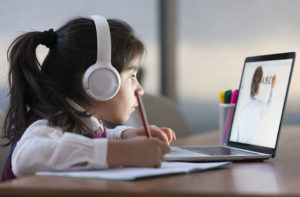03 Sep Innovation in the time of corona
Innovation in the time of corona: How Shepherd’s learning pods help students overcome pandemic-related learning loss

This summer, McKinsey & Co., a management consulting firm, published a report about student learning loss amid the COVID-19 pandemic. It carried this disturbing headline: “The hurt could last a lifetime.”
That hurt, like so many of the pandemic’s consequences, hasn’t been distributed evenly across American society. The report concluded that while the average American student could lose seven months of academic progress, Black children may lose as much as 10 months in acquiring foundational academic skills and Latino students could lose nine months. Children from lower-income families of all races and ethnic backgrounds also are at high risk of falling behind in their studies.
“Lower-income students are less likely to have access to high-quality remote learning or to a conducive learning environment, such as a quiet space with minimal distractions, devices they do not need to share, high-speed internet, and parental academic supervision,” the McKenzie report found.
And, without significant interventions, pandemic-related learning losses are likely to lead to lower-paying jobs, higher risk of extended unemployment and fewer opportunities to break from the cycle of poverty.
In short, a generation of children may suffer the economic consequences of the pandemic for the rest of their lives.
To confront that emerging reality, Shepherd Community Center has launched a cutting-edge approach to education in the year of the coronavirus: learning pods.
The pods, sometimes called micro schools, have popped up across the country as parents have come to realize that online instruction by itself leaves their children isolated and vulnerable to failure. The pods involve small groups of students who meet for in-person instruction or tutoring, and they’ve become a favored method for higher-income families striving to ensure their children’s success.
But Shepherd has brought learning pods to the near east side of Indianapolis, where poverty is prevalent. Shepherd recently launched a middle and high school pod that meets at Cornerstone Lutheran Church on east New York Street.
A pod for elementary students is set to meet at Kids Inc. on east Palmer Street. And Shepherd is working with Indianapolis Public Schools to open a second pod for elementary-age students.
The three pods, which eventually will serve about 125 students, center on not only tutoring but also enrichment activities. And students receive breakfast and lunch at the sites.
“While our middle and high school soft launch at Cornerstone is still small and growing, we have already noticed the huge opportunity to deepen relationships with students,” Andrew Green, Shepherd’s assistant executive director, said. “Each site will be open from 8:30 a.m. to 3:30 p.m., and that is an incredible amount of time to build into students and staff. Volunteers are already embracing that and getting excited about it.”
Green said Shepherd will need more volunteers to help with meals and other support services as the pods grow.
Education is at the core of Shepherd’s mission to shatter the cycle of poverty on the near east side. The pandemic poses a special challenge to that mission, but the Shepherd team has responded in a number of innovative ways – from turning the parking lot into a mobile hot spot to staging drive-through food giveaways for hundreds of families.
Learning pods are one more innovative adaptation in unprecedented times.
“We are responsible for the education of our neighbors,” Shepherd Executive Director Jay Height said. “We are called to educate, and we must find ways to serve both those who are in the academy on our site as well as our other neighbors.”

